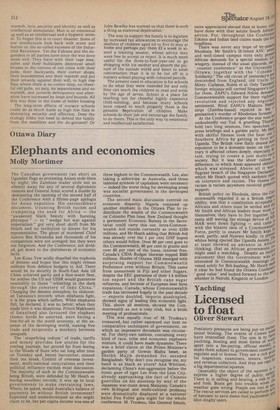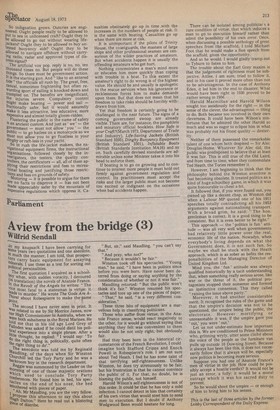Yachting
Licensed to float
Oliver Stewart
Predatory pressures are being put on recree done! boating. The events of Cowes ‘Yerce have intensified them. The aim is to "c6tei yachting, boating and most forms of W..8 sport into a fee-paying, official moului to make them subject to government controi;,0 regulate and to license. They are a richrs for inspectors, examiners, testers, lawrefor and revenue collectors. And they are ripe a big departmental squeeze. s t° Ostensibly the object of the squeeze express a higher degree of public sa9ile There is, in sailing and boating, a risk t° the and limb. Boats get into trouble when weather goes wrong. Poeple are lost at The rescue services are called to perform 3 of heroism to save damn-fool yachtsmen °' idiot dinghy users. So indignation grows. Outcries are engineered. Ought people really to be allowed to put to sea in unlicensed craft? Ought they to be allowed to go out without wearing lifejackets? Ought they to be allowed to buy untested buoyancy aids? Ought they to be talowed to navigate offshore without carrying radio, radar and approved types of distress signal? The artificial vox pop. reply is no, no, ten thousand times no. But people will do these things. So there must be government action. It is the starting gun. And " like to an entered tide " the officials all rush by. The great, free, Casual, sometimes frightening but often rewarding sport of sailing is knocked down and trampled on. The benefits are insignificant. the injuries severe. Compulsory control might make boating — power and sail — fractionally safer, but it would assuredly Make it less attractive, less educative, more expensive and almost totally gloom-ridden. Flustering the public in the name of safety IS an ancient custom. And just as ' we ' — the government — must not allow ' you ' — the public — to go hatless on a motorcycle so we must not allow you to go floatless in your dinghy or raft-less in your yacht. So in rush the life-jacket makers, the navigational equipment firms, the instructional organisations, followed closely by the investigators, the testers, the quality conrollers.the certificators — all, all of them ap13„iying their restrictions and fees to recreational boating and justifying those restrictions and fees on grounds of safety.
Motoring — it is possible to argue for there are no facts to disprove it — has not been
Mari
n --e appreciably safer by the mountain of cxPensive regulations which oppress it, Ca
sualties obstinately go up in time .with the increases in the numbers of people at risk. It is the same with boating. Casualties go up when there are more at risk.
It is unimportant if the pilots of Trinity House, the coastguards, the masters of large ships and other professional seamen are censorious of the wilder practices of amateurs. But when accidents happen it is usually the offending amateurs who get hurt.
Nothing concentrates a man's mind more or educates him more quickly than coping with trouble in a boat. To this extent the amateur's right to do wrong is of the highest value. He should be and usually is apologetic to the rescue services when his ignorance or recklessness forces him to make demands upon them. But that does not mean that his freedom to take risks should be forcibly withdrawn from him.
Yet that freedom is certainly going to be challenged in the near future, The signs of a coming government swoop are already visible. There are, for instance, the pamphlets and minatory official booklets. How Safe is your Craft?(March 1973, Department of Trade and Industry), Life-Saving Jackets (British Standard 3595), Dinghy Buoyancy Equipment (British Standard 3501), Inflatable Boats (British Standards Institution MA16) and so on. Such carefully devised standards are admirable unless some Minister takes it into his head to enforce them.
If boating is to go on growing and to continue to interest more people it must hold out firmly against government regulation and control. Its practitioners must accept the risks and the larger public must not become too excited or indignant on the occasions when bad accidents happen.

































 Previous page
Previous page